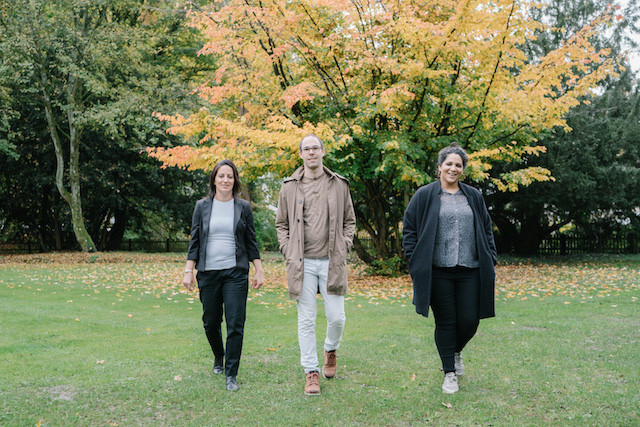During his recent trip to Luxembourg, the Council of Europe’s commissioner for human rights Nils Muižnieks stated that “solutions must be found to enable asylum seekers and beneficiaries of international protection to integrate Luxembourg’s labour force as early as possible”.
Whilst the Luxembourg government has implemented several initiatives to facilitate access to employment for asylum seekers, the numbers who actually find work remain low. Delano spoke with two organisations that are helping to bridge this gap.
The Connections project was established by the Association de Soutien aux Travailleurs Immigrés, the foreign workers’ rights association, in May 2016, and is open to both asylum seekers and those who have been granted refugee status.
Funded by the Œuvre Nationale de Secours Grande-Duchesse Charlotte’s Mateneen coordination unit, Connections provides training, workshops and unpaid internships for those who complete the selection process, easing their path to integration in the local workplace.
To date, 106 individuals have taken part in the programme, 58 of whom have gone on to find unpaid internships. Zina Menhal is a project coordinator at Connections, and as a former journalist in Baghdad she is acutely aware of the difficulties faced by those entering the workplace.
“The first barrier which must be overcome is language and especially French,” Menhal explains. “In general, French is the most requested language in job offers and Asti offers language courses as well as conversational meeting groups where refugees can sit alone or with volunteers to practice their French language skills.”
The importance of a CV
In addition, many refugees do not know the importance of a CV or a job interview. “We offer workshops on subjects such as CV writing, how to attend a job interview and preparing for an internship,” adds Menhal.
It is also vital that refugees adopt their professional skills for the Luxembourg market. “An architect, who worked in Iraq, may have followed different procedures to those we have in Luxembourg, so training is needed to allow them to learn the Luxembourg context of their job.”
Since the beginning of the project the Connections team has worked closely with local companies to guarantee internships for their participants. However, they are still actively looking for organisations willing to provide places for their applicants.
“From our last group, we are currently seeking 27 unpaid internships for the remaining participants. These internships will support the work we are doing and further the integration of refugees into our society.”
Digital Inclusion is another organisation helping refugees utilise their talents and learn new skills. Founded by Patrick de la Hamette and Isabelle Mousset in May 2016, Digital Inclusion is also funded by the Œuvre Nationale de Secours Grande-Duchesse Charlotte.

Photo: Marion Dessard, Patrick de la Hamette of Digital Inclusion
“Our principle belief is that everyone in society should have the right to digital inclusion, that it should not be limited to refugees only, but include all vulnerable people living in Luxembourg,” says de la Hamette.
“Having access to the digital world is becoming a necessity and everyone should have access to a computer.” De la Hamette says he became aware of the lack of digital resources available to refugees from attending welcome meetings back in 2015 during the peak of the refugee crisis. “I started by myself helping one refugee gain access to the internet through a large antenna I happened to have. From there I began posting requests via my own social media site for used computers and laptops, and things just grew.”
700 requests for computers
In 2016, Digital Inclusion received 700 requests from refugees and asylum seekers for computers. To date, de la Hamette and his team have distributed 1,070 and currently have 150 requests on their waiting list.
All of the computers have been donated by individuals from both the private and public sectors. “Once we started to receive the computers, we then set about the process of repairing them and ensuring data protection,” he explains. “We invited refugees and volunteers to attend workshops on how to repair the computers, so they could be proactively involved and learn new skills.”
Digital Inclusion runs repair workshops on Mondays and Tuesdays in the basement of the Hariko building, as well as a female-only repair workshop on Friday afternoons in partnership with Women in Digital Empowerment.
Digital Inclusion also teaches participants how to learn languages through computers and how to use MS Office in English and French rather than Arabic.
“Through the programme and the support of the Œuvre we have been able to hire two employees, a project manager and an IT technician, so we have provided real jobs to refugees.” Indeed, Digital Inclusion was one of the first organisations permitted to employ asylum seekers to teach and run workshops.
Like Menhal, de la Hamette believes that learning a European language is crucial for refugees to find work in Luxembourg and access to a computer facilitates the ability for individuals and families to proactively learn via online courses.
“Digital access provides individuals with autonomy,” he says. “A computer can not only educate, but it allows social interaction with loved ones, entertainment and so much more.” De la Hamette’s goal is that every refugee in Luxembourg should have a computer and with the public’s ongoing support that is certainly an achievable goal.
